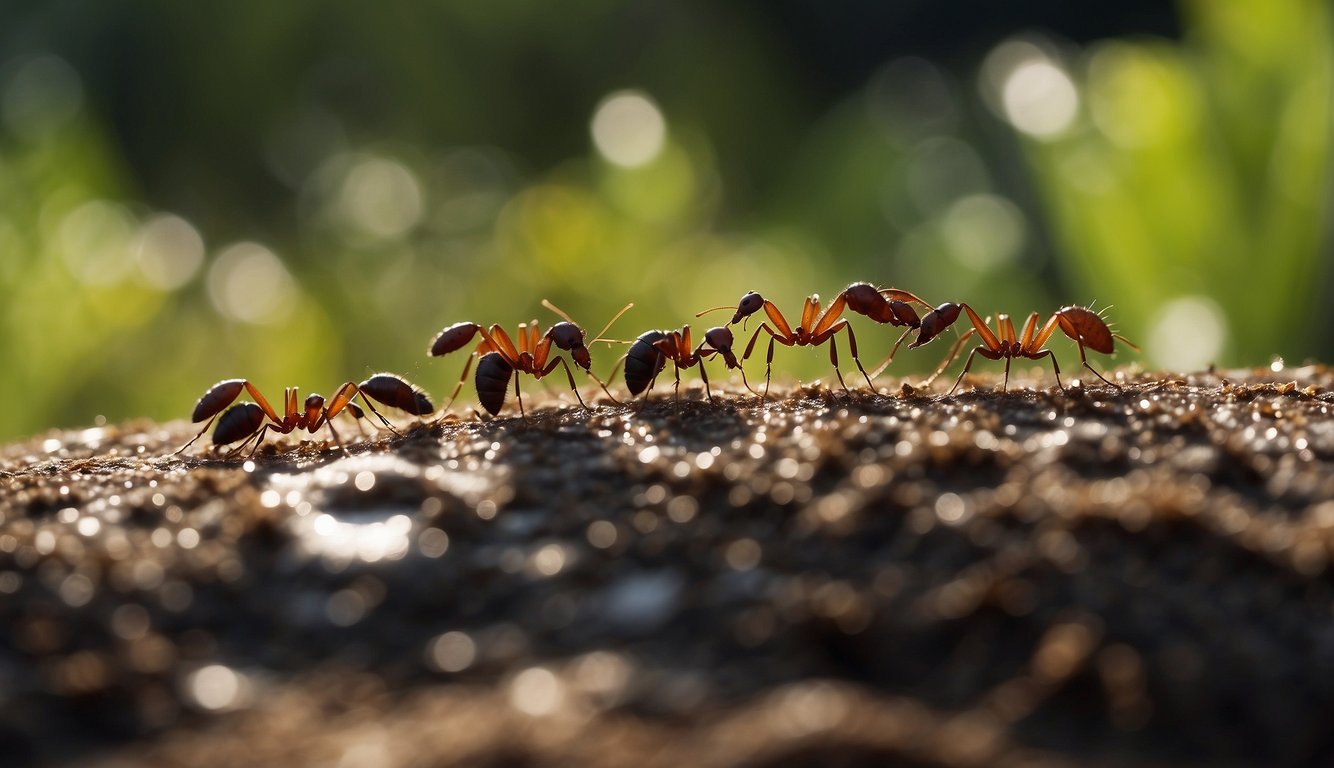TheHerbProf.com is a treasure trove of knowledge for those interested in natural healing and herbal remedies. The website is run by Paul Johnston MD. A naturopathic who has not only received extensive education in the field but also has personal experience in self-healing.
I have done some research to answer the question, “Does vinegar repel ants?” Ants can be a nuisance in the home, and many people are searching for natural and safe ways to control them. Vinegar is a commonly suggested solution for repelling ants, but does it actually work?
According to my findings, vinegar can be an effective way to repel ants. The strong, acidic smell of vinegar overwhelms their sense of smell, which confuses the ant and causes it to leave the area. Ants rely on their sense of smell to survive and communicate with each other, so disrupting their ability to do so can be an effective way to control them. Additionally, vinegar can eliminate the chemical trails left behind by other ants, making it harder for them to follow each other to food sources.
It’s important to note that while vinegar can be a natural and safe way to control ants, it may not be a foolproof solution. Ants can be persistent and may find ways around the vinegar barrier. Additionally, vinegar may not be effective for all types of ants. It’s always a good idea to practice good sanitation habits and keep food sources sealed and stored properly to prevent ant infestations.
Understanding Ant Behavior and Deterrence
As someone who has dealt with ant infestations before, I understand how frustrating it can be to have these little creatures crawling all over your home. Ants are social insects that live in colonies, and they rely heavily on chemical trails, also known as pheromone trails, to communicate with each other and navigate their environment.
When an ant finds a food source, it will lay down a chemical trail for other ants to follow. This trail is made up of pheromones, which are chemical signals that ants use to communicate with each other. Other ants will then follow this trail to the food source, and they will continue to lay down more pheromones as they travel back and forth between the food source and the colony.
This is where vinegar comes in. Vinegar is highly acidic, and it disrupts the chemical trails that ants use to navigate their environment. By spraying vinegar around your home, you can effectively erase these trails and confuse the ants. This will make it more difficult for them to find their way back to the colony and to communicate with each other.
It’s important to note that vinegar does not actually kill ants.
Instead, it acts as a potent deterrent by disrupting their scent trails and confusing them. This means that while vinegar can be effective at keeping ants at bay, it may not be enough to completely solve an ant problem.
There are many different types of ants, and each species has its own unique behavior and preferences. Some ants, such as carpenter ants, prefer to nest in wood, while others, like pavement ants, prefer to nest in soil. Understanding the behavior and preferences of the ants in your home can help you to better target your ant control efforts.
In summary, vinegar can be an effective way to repel ants by disrupting their chemical trails and confusing them. However, it may not be enough to completely solve an ant problem, and it’s important to understand the behavior and preferences of the ants in your home in order to effectively control them.
The Role of Vinegar in Ant Repellent
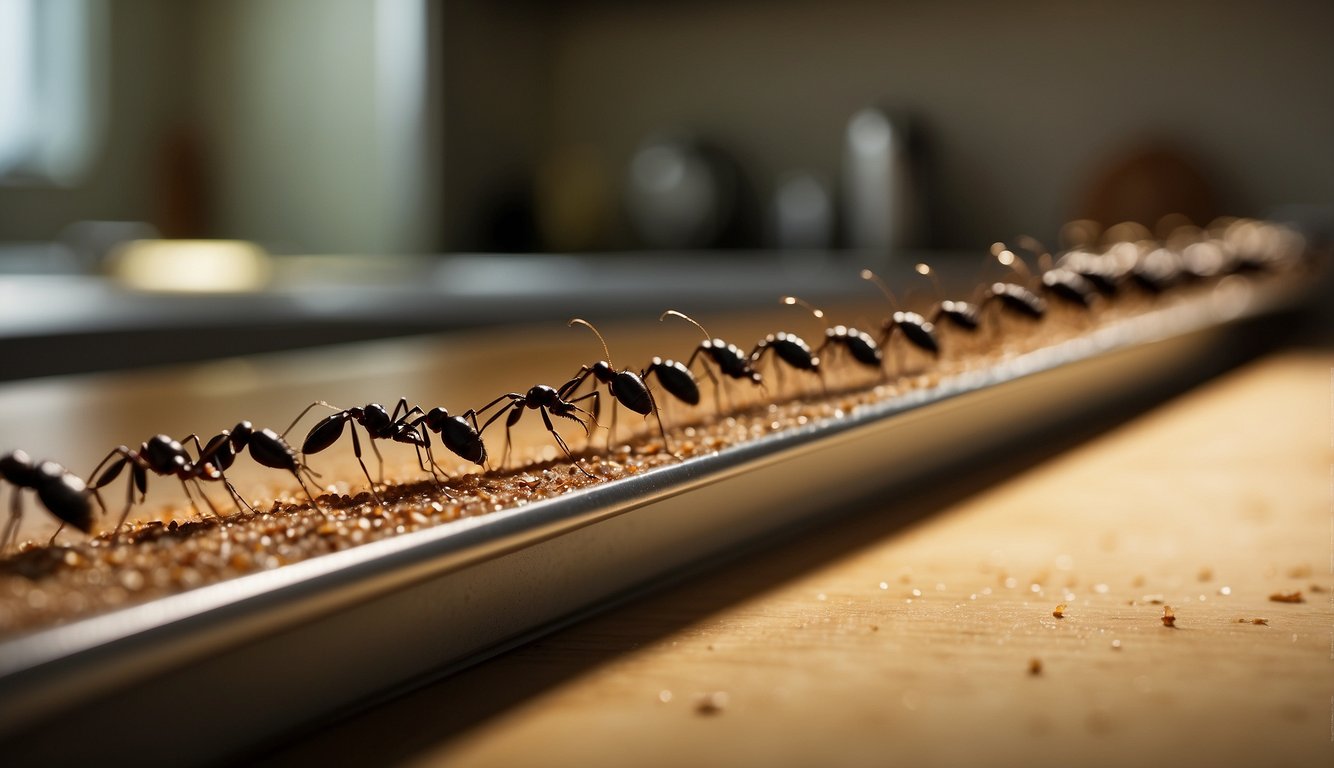
As a natural repellent, vinegar is an effective and safe way to repel ants from your home. It is easy to use and clean, making it a popular choice for those who want to avoid using harmful chemicals.
Vinegar’s Effect on Ants
Vinegar works by disrupting ant activity through its strong scent. Ants rely on scent trails and pheromones to communicate with each other and find food sources. The smell of vinegar overwhelms their senses and disrupts their ability to follow their scent trail.
Acetic acid, the active ingredient in vinegar, also plays a role in repelling ants. It interferes with their ability to detect food sources and communicate with each other.
Using Vinegar as a Repellent
To use vinegar as a repellent, mix equal parts white vinegar and water in a spray bottle. Spray the solution around areas where ants are entering your home or where they are congregating. You can also soak cotton balls in the solution and place them in areas where ants are present.
It is important to note that while vinegar is effective at repelling ants, it will not eliminate an entire colony. It is best used as a preventative measure or as a way to repel ants that have already entered your home.
White vinegar is the most commonly used type of vinegar for ant repellent, but apple cider vinegar can also be used. However, it is important to use a vinegar with a high acetic acid content for the best results.
In summary, vinegar is an easy and effective way to repel ants from your home. Its strong scent and acetic acid content disrupt ant activity and make it difficult for them to communicate with each other. By using a vinegar spray or soaking cotton balls in vinegar, you can keep ants at bay without using harmful chemicals.
Pros and Cons of Using Vinegar as an Ant Deterrent
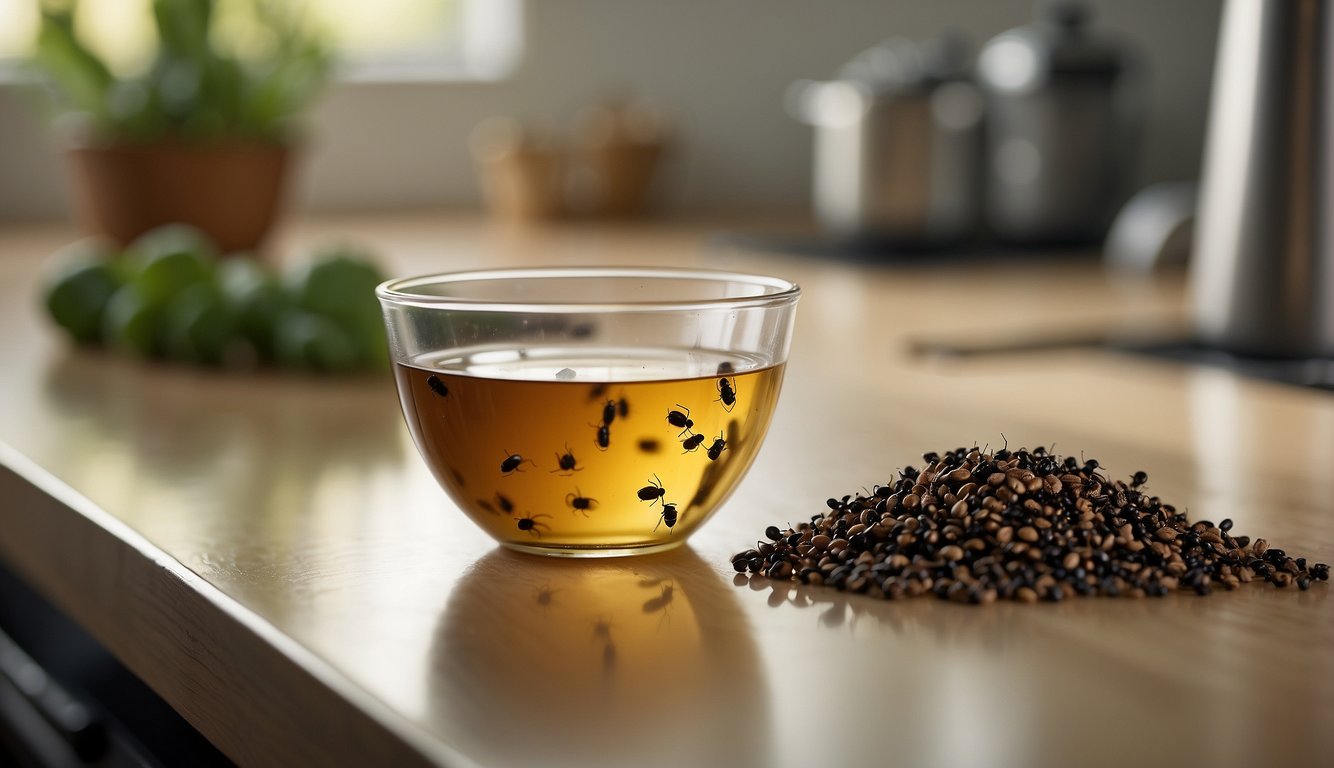
Effectiveness
Vinegar is a popular household item that can be used to repel ants. It is a natural and affordable solution that can be easily found in most homes. The acetic acid in vinegar disrupts the ants’ sense of smell, making it difficult for them to navigate. When applied correctly, vinegar can be an effective way to repel ants and prevent them from coming back.
However, it’s important to note that vinegar may not work for all types of ants. Some ants are attracted to vinegar, and in some cases, vinegar may only serve as a temporary solution. It’s also important to identify and eliminate the source of the ant infestation, as vinegar alone may not be enough to solve the problem.
Post-application Smell
One of the main drawbacks of using vinegar as an ant deterrent is the strong smell it leaves behind. While some people may not mind the aroma of vinegar, others find it unpleasant and overpowering. Additionally, the smell of vinegar can linger for several hours or even days after application, which may not be desirable for those with sensitive noses or houseplants.
To minimize the smell of vinegar after application, it’s recommended to dilute the vinegar with water and use a glass spray bottle instead of plastic. It’s also important to properly ventilate the area after application to help dissipate the smell.
Using vinegar as an ant deterrent has both pros and cons. While it is a natural and affordable solution that can be effective in repelling ants, it may not work for all types of ants and may leave behind a strong smell. It’s important to weigh the pros and cons before using vinegar as a solution for ant infestations.
Other Natural Ways to Repel Ants
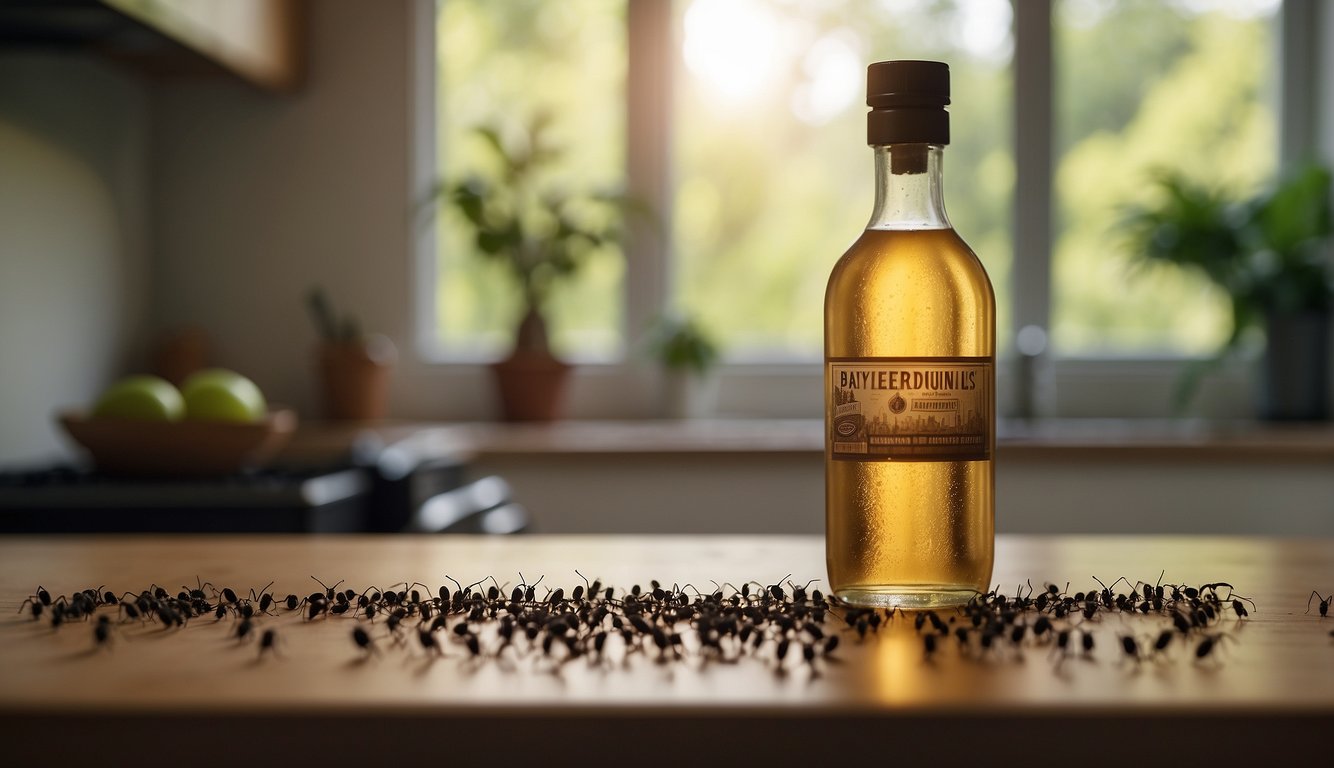
Aside from vinegar, there are many other natural ways to repel ants. Here are a few:
- Peppermint oil: Ants don’t like the smell of peppermint oil, so it’s a great natural repellent. Simply mix a few drops of peppermint essential oil with water in a spray bottle and spray it around the areas where ants are entering your home.
- Diatomaceous earth: This is a fine powder made from the fossilized remains of tiny aquatic organisms. Sprinkle it around the areas where ants are entering your home. The powder will stick to the ants and cause them to dehydrate and die.
- Boric acid: Boric acid is a natural insecticide that is toxic to ants. Mix equal parts of boric acid and sugar and sprinkle it around the areas where ants are entering your home. The ants will be attracted to the sugar and will carry the boric acid back to their nest, killing the entire colony.
- Cinnamon: Ants don’t like the smell of cinnamon, so it’s a great natural repellent. Sprinkle cinnamon around the areas where ants are entering your home.
- Neem oil: Neem oil is a natural insecticide that is toxic to ants. Mix a few drops of neem oil with water in a spray bottle and spray it around the areas where ants are entering your home.
And Also…
- Tea tree oil: Ants don’t like the smell of tea tree oil, so it’s a great natural repellent. Mix a few drops of tea tree oil with water in a spray bottle and spray it around the areas where ants are entering your home.
- Lavender: Ants don’t like the smell of lavender, so it’s a great natural repellent. Place lavender sachets around the areas where ants are entering your home.
- Lemon eucalyptus: Lemon eucalyptus is a natural insecticide that is toxic to ants. Mix a few drops of lemon eucalyptus oil with water in a spray bottle and spray it around the areas where ants are entering your home.
- Orange: Ants don’t like the smell of orange, so it’s a great natural repellent. Rub orange peels around the areas where ants are entering your home.
- Coffee grounds: Ants don’t like the smell of coffee, so it’s a great natural repellent. Sprinkle coffee grounds around the areas where ants are entering your home.
Let’s Not Forget About:
- Cornstarch: Cornstarch is a natural insecticide that is toxic to ants. Sprinkle cornstarch around the areas where ants are entering your home. The ants will eat the cornstarch and it will expand in their stomachs, killing them.
- Mint: Ants don’t like the smell of mint, so it’s a great natural repellent. Place mint leaves around the areas where ants are entering your home.
- Borax: Borax is a natural insecticide that is toxic to ants. Mix equal parts of borax and sugar and sprinkle it around the areas where ants are entering your home. The ants will be attracted to the sugar and will carry the borax back to their nest, killing the entire colony.
- Red pepper: Ants don’t like the smell of red pepper, so it’s a great natural repellent. Sprinkle red pepper around the areas where ants are entering your home.
Before You Go – Does Vinegar Repel Ants?
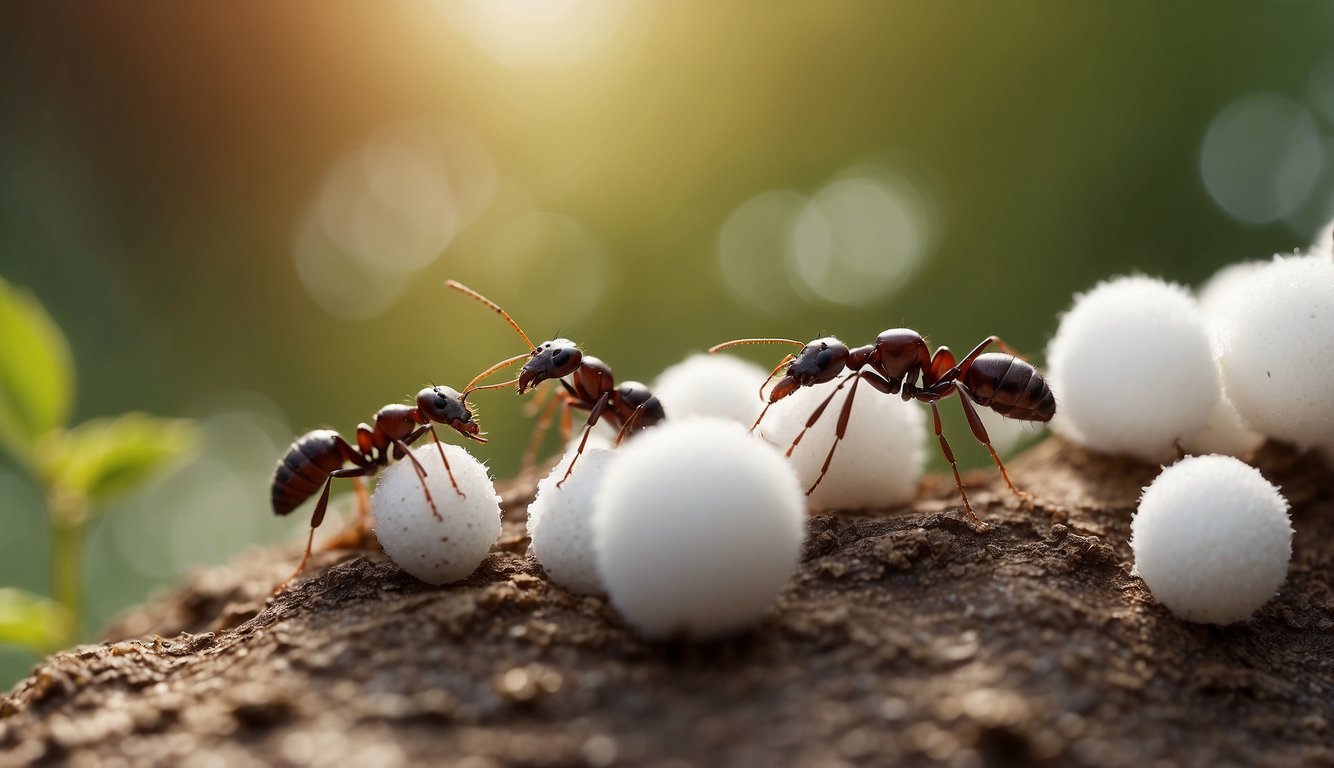
Vinegar can be an effective natural repellent for ants. The strong, acidic smell of vinegar overwhelms the ant’s sense of smell, causing it to become confused and leave the area. While vinegar does not have an exterminating effect on ants, it can be an effective way to repel them.
Using vinegar as an insect repellent is a safe and organic alternative to chemical pest control methods. It is also an inexpensive and readily available solution, as most households already have vinegar in their kitchens.
However, it is important to note that vinegar may only provide a temporary solution to ant infestations. It is important to identify and address the root cause of the infestation, such as food or water sources, to prevent ants from returning.
Overall, vinegar can be a useful tool in pest control, but it should be used in conjunction with other methods for long-term prevention and management of ant infestations.
The Tangy Connection: Does Vinegar Repel Ants and The Herb Prof
Let’s delve into the tangy topic of Does Vinegar Repel Ants and its connection to our herbal paradise, theherbprof.com. Ready for a tangy adventure?
Firstly, using vinegar to repel ants is a practice of natural pest control. It’s about protecting our plants from pesky ants in an eco-friendly way. Sounds familiar? That’s because theherbprof.com helps you protect your herbal knowledge from misinformation!
Secondly, both vinegar and theherbprof.com are about sustainable practices. Just like vinegar provides a natural solution for ant control, theherbprof.com promotes sustainable practices in herb cultivation.
Lastly, they both aim to enrich our lives. A garden free of ants brings joy to our hearts, while theherbprof.com brings joy to our minds with herbal wisdom.
So, there you have it! Does Vinegar Repel Ants and theherbprof.com are a tangy pair indeed. They both symbolize natural pest control, sustainable practices, and enrichment. Now, isn’t that a tangy piece of information to share at your next garden party? Keep growing, folks!
References – Does Vinegar Repel Ants?
Little Herb Encyclopedia, by Jack Ritchason; N.D., Woodland Publishing Incorporated, 1995
The Ultimate Healing System, Course Manual, Copyright 1985, Don Lepore
Planetary Herbology, Michael Tierra, C.A., N.D., Lotus Press, 1988
Handbook of Medicinal Herbs, by James A. Duke, Pub. CRP Second Edition 2007
The Complete Medicinal Herbal, by Penelope Ody, Published by Dorling Kindersley
Check the Following Articles!
Is Bone Meal Good for Potatoes? A Comprehensive Answer
How To Use Diatomaceous Earth For Ants Control
How to Propagate Dill: A Step-by-Step Guide
Frequently Asked Questions – Does Vinegar Repel Ants?

How effective is vinegar as an ant repellent?
Vinegar is an effective ant repellent due to its strong, acidic smell that overwhelms their sense of smell, causing confusion and disorientation. The acetic acid in vinegar also disrupts the pheromone trails that ants use to communicate with each other. However, it is important to note that vinegar is not a foolproof solution and may not work in all situations.
What natural remedies are best for keeping ants out of the home?
In addition to vinegar, there are several other natural remedies that can help keep ants out of the home. These include cinnamon, lemon juice, peppermint oil, and diatomaceous earth. However, it is important to note that these remedies may not be as effective as chemical pesticides and may require more frequent application.
What duration of protection can be expected when using vinegar against ants?
The duration of protection when using vinegar against ants can vary depending on several factors, including the concentration of vinegar used, the frequency of application, and the severity of the ant infestation. In general, vinegar should be reapplied every few days to maintain its effectiveness.
Are there any specific mixtures involving vinegar that are more effective in repelling ants?
While vinegar can be effective on its own, there are several mixtures that can enhance its ant-repelling properties. For example, mixing vinegar with water in a 1:1 ratio can increase its coverage area and make it easier to apply. Adding a few drops of essential oils such as peppermint, tea tree, or citrus can also enhance its ant-repelling properties.
Can vinegar be used to deter flying ants as well?
Yes, vinegar can be used to deter flying ants as well. Simply mix vinegar and water in a spray bottle and apply it to areas where flying ants are present. However, it is important to note that vinegar may not be as effective against flying ants as it is against crawling ants.
What other household substances can eliminate ants besides vinegar?
In addition to vinegar, there are several other household substances that can eliminate ants, including baking soda, borax, and coffee grounds. However, it is important to use these substances with caution and follow proper safety guidelines, as they can be harmful to pets and children if ingested.
